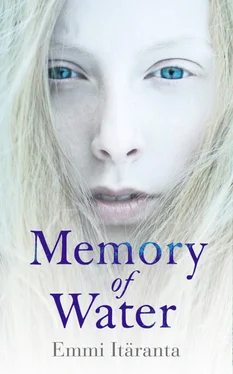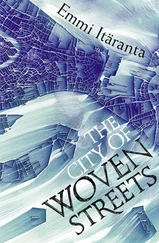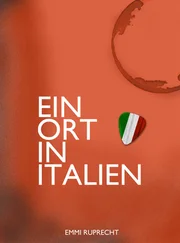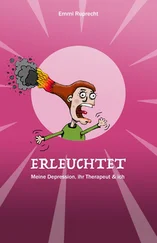He turned both levers. The rush of water slowed down and died little by little, and the hatch opened again.
‘You first,’ he said.
I dropped myself through the hole. He closed the skin tightly, then lowered it carefully into the cave where I took it from him. When the hatch was closed again, the cave looked like nothing but a cave with no secrets.
The glow of the blazeflies faded swiftly in the daylight. When we walked into the garden, my mother, sitting under the awning, raised her eyes from the notes she was taking from a heavy book on her lap. My father handed his lantern to me. The shadows of leaves swayed on the stone slabs, as he walked towards the teahouse with the waterskin on his back. I was going to follow him, but he said, ‘Not now.’
I stood still, a lantern in each hand, and listened to the blazeflies bouncing against their sun-baked glass walls. It was only when my mother spoke that I thought of opening the lids of the lanterns.
‘You’ve burned again in the sun,’ she said. ‘Where did you go with your father?’
The blazeflies sprang up into the air and vanished into the bushes.
‘To a place that doesn’t exist,’ I said, and at that moment I looked at her, and knew that she knew where we had been, and that she had been there too.
My mother didn’t say more, not then, but calm vanished from her face.
Late that night, when I lay in my bed under an insect net and watched the orange light of the night sun on the pine trees, I heard her speaking with my father in the kitchen for a long time. I couldn’t make out the words they were saying, yet I discerned a dark edge in them that reached all the way to my dreams.
The ground was still breathing night-chill when I helped my father load the broken waterskins on the low cart at the back of the helicycle. Their scratched plastic surface glinted in the morning sun. I fastened the thick straps around the skins, and when I was certain they were sufficiently steady, I flung my seagrass bag on my shoulder and got up on the seat of the cycle.
‘Use Jukara,’ my father said. ‘He’ll give you a discount.’ Jukara was the oldest plasticsmith in the village and my father’s friend. I hadn’t trusted him since some waterskins he had repaired the year before had broken again after only a few uses, so I said nothing, merely moved my head in a way that could be interpreted as a nod. ‘And don’t take all day,’ my father added. ‘We have guests coming in tomorrow. I need your help with cleaning the teahouse.’
I stepped on the pedal to start the helicycle. One of the solar panels was broken and the motor was acting up, so I had to pedal almost all the way along the dusty pathway through trees of wavering gold-green scattered around our house. Only just before the edge of the woods did the cycle settle into a steady, quiet spin. I steered the cycle and the cart carefully to the wider road, locked the pedals and let my feet rest on them as the cycle moved unhurriedly towards the village. The morning air felt crisp on my bare arms and there weren’t many horseflies yet. I removed my insect hood, letting the wind and sun wash over my face. The sky was a dry, bare blue, and the earth was still, and I saw small animals moving in the dust of the fields in search of water.
After I had passed a few houses at the edge of the village, the road forked. The way to Jukara’s repair shop was to the left. I stopped and hesitated, and then I continued to the right, until I saw the familiar chipped-blue picket fence ahead.
Like most buildings in the village, Sanja’s home was one of the past-world houses, a one-storey with multiple rooms, a garden and a garage from the time when most people still owned fast past-tech vehicles. The walls had been repaired repeatedly, and Sanja’s parents had told me there had once been a nearly flat roof without solar panels, although it was hard for me to imagine.
When I stopped outside the open gate, she was standing in the front yard, emptying the last of a waterskin into a metal tub and cursing. The front door was open and a barely audible flow of pod-news was drifting from inside the house through the insect curtain covering the doorframe. Sanja wasn’t wearing an insect hood, and when she looked at me, I saw that she hadn’t slept.
‘Bloody sham sold me salt water,’ she said, furiously tucking her black hair behind her ears. ‘I don’t know how he did it. I tasted the water first, like I always do, and it was fresh. His prices were atrocious, so I only bought half a skin, but even that was wasted money.’
‘What sort of a container did he have?’ I asked as I steered the cycle through the gate to the yard.
‘One of those old-fashioned ones,’ Sanja said. ‘A large transparent container on top of a dais, and a pipe from which he sold the water.’
‘A double-pipe fraud,’ I said. ‘I saw those in the city last year. Inside the dais there’s a secret container with salt water in it. The pipe has two settings; the first one takes water from the fresh-water container and the second from the hidden one. The seller offers a taste from the drinkable water, but then changes the pipe setting and sells salt water.’
Sanja stared at me for a moment and said then, ‘Stupid idiot.’ I knew she was talking about herself. She must have spent most of her budget for the week on the salt water.
‘It could have happened to anyone,’ I told her. ‘You couldn’t have known. Might still be a good idea to warn others, though.’
Sanja sighed. ‘I saw some other people buying from him at the evening market right before the closing time. He’s probably far away by now, looking for the next idiot.’
I didn’t say aloud what I was thinking: more than once I had heard my parents talk about how seeing lots of frauds on the move usually meant that the times were getting harsher, no matter how often the pod-news repeated that all unrest was temporary and the war was well under control. In the best of times there was sometimes shortage of water, but mostly people were able to do with their monthly quotas and shams didn’t bother to go touring. While travelling water merchants who occasionally stopped in small villages kept high prices, they were also aware of how easily their business could be jeopardised and didn’t treat any rivals selling undrinkable water kindly. Shams weren’t unheard of, but this was the third one in our village within two months. This kind of sudden increase in numbers usually meant that there were strong rumours in the cities about new and stricter quota plans, perhaps even rationing, and some of the water-shams left the overcrowded markets of the cities in search of less competition and more gullible clients.
‘Is your water pipe out of order again?’ I asked.
‘That old piece of rubbish needs to be dug up and replaced with a new one,’ Sanja said. ‘I’d do it myself if I had time. Minja fell sick again last week, and I don’t dare to give her our tap water even if it’s been boiled. Father says it’s perfectly fine, but I think he’s just grown an iron stomach after drinking dirt water for so many years.’
Minja was Sanja’s two-year-old little sister who had been sick constantly since her birth. Lately their mother Kira had also been unwell. I had not told Sanja, but once or twice in the half-light of late evening I had seen a stranger sitting by their door, a dark and narrow figure, not unkind but somehow aware that it wouldn’t be welcomed anywhere it went. It had been still and quiet, waiting patiently, not stepping inside, but not moving away, either.
I remembered what my father had told me about death and tea masters, and when I looked at Sanja, at the shadows of unslept hours on her face that wasn’t older than my own, the image of the figure waiting by their door suddenly weighed on my bones.
Читать дальше
Конец ознакомительного отрывка
Купить книгу












